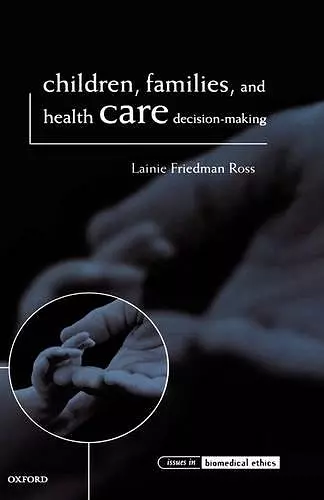Children, Families, and Health Care Decision-Making
Format:Hardback
Publisher:Oxford University Press
Published:17th Dec '98
Currently unavailable, and unfortunately no date known when it will be back
This hardback is available in another edition too:
- Paperback£54.00(9780199251544)

ISSUES IN BIOMEDICAL ETHICS General Editors: John Harris, University of Manchester; S(ren Holm, University of Copenhagen. Consulting Editor: Ranaan Gillon, Director, Imperial College Health Service, London. North American Consulting Editor: Bonnie Steinbock, Professor of Philosophy, SUNY, Albany. The late twentieth century has witnessed dramatic technological developments in biomedical science and the delivery of health care, and these developments have brought with them important social changes. All too often ethical analysis has lagged behind these changes. The purpose of this series is to provide lively, up-to-date, and authoritative studies for the increasingly large and diverse readership concerned with issues in biomedical ethics--not just health care trainees and professionals, but also social scientists, philosophers, lawyers, social workers, and legislators. The series will feature both single-author and multi-author books, short and accessible enough to be widely read, each of them focused on an issue of outstanding current importance and interest. Philosophers, doctors, and lawyers from several countries already feature among the contributors to the series. It promises to become the leading channel for the best original work in this burgeoning field. this book: Lainie Friedman Ross presents an original and controversial examination of the moral principles that guide parents in making health care decisions for their children, and the role of children in the decision-making process. She opposes the current movement to increase child autonomy, in favour of respect for family autonomy. She argues that children should be included in the decision-making process but that parents should be responsible for their children's health care even after the children have achieved some threshold level of competency. The first half of the book presents and defends a model of decision-making for children's health care; the second half shows how it works in various practical contexts, considering children as research subjects and as patients, organ donorship, and issues relating to adolescent sexuality. Implementation of Ross's model would result in significant changes in what informed consent allows and requires for paediatric health care decisions. This is the first systematic medical ethics book that focuses specifically on children's health care. It has important things to say to health care providers who work with children, as well as to ethicists and public policy analysts.
I strongly recommend this book to anyone who wants to gain valuable insight into the ethical issues involving the child as a research subject, as an organ donor, as a patient, and as a sexually active adolescent. As a physician and a philosopher, Ross brings a wealth of experience and analytical ability to these contemporary ethical problems. * Ethics *
Worth reading, worth discussing and ... worth prescribing for students of children's rights, medical law and bioethics. * The International Journal of Children's Rights *
There is much in this book that should provide material for lively discussion and debate about who ought to have authority to make health care decisions for children and how far this authority extends ... the balance of theory and application in the book ought to make it interesting reading for bioethicists and health professionals alike. * Bioethics *
ISBN: 9780198237631
Dimensions: 225mm x 143mm x 18mm
Weight: 388g
212 pages